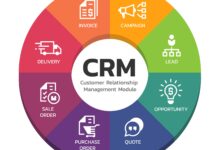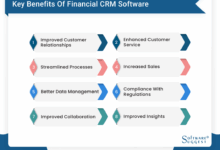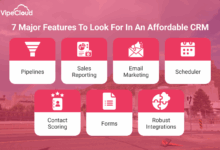CRM With AI Chatbot Integration: Enhancing Customer Relationships With Advanced Technology
CRM with AI Chatbot Integration sets the stage for this enthralling narrative, offering readers a glimpse into a story that is rich in detail and brimming with originality from the outset. In a world where customer relationships are paramount, the fusion of CRM and AI chatbots promises to revolutionize the way businesses interact with their clientele.
As we delve deeper into the realms of AI-powered customer management, a myriad of possibilities emerge, transforming mundane tasks into seamless experiences and personalized engagements. Let’s embark on this journey together to explore the boundless potential of CRM with AI Chatbot Integration.
Introduction to CRM with AI Chatbot Integration
CRM (Customer Relationship Management) systems are essential tools for businesses to manage interactions with current and potential customers. These systems help companies streamline processes, improve customer service, and ultimately drive sales. On the other hand, AI chatbots are intelligent virtual assistants that can engage in conversations with users, providing instant support and information.
Integrating AI chatbots into CRM systems offers a wide range of benefits for businesses. By leveraging AI technology, companies can automate customer interactions, provide 24/7 support, and personalize customer experiences. AI chatbots can handle routine inquiries, freeing up human agents to focus on more complex tasks. This integration also enables businesses to gather valuable data about customer preferences and behavior, which can be used to improve marketing strategies and product offerings.
Benefits of integrating AI chatbots into CRM systems:
- Improved customer service: AI chatbots can provide instant responses to customer inquiries, enhancing the overall customer experience.
- Cost-effective solution: Automating customer interactions with AI chatbots can reduce operational costs and increase efficiency.
- Personalized interactions: AI chatbots can analyze customer data to deliver personalized recommendations and offers, leading to higher customer satisfaction and loyalty.
- Scalability: AI chatbots can handle multiple customer conversations simultaneously, allowing businesses to scale their customer support operations without increasing headcount.
Examples of industries that can benefit from CRM with AI Chatbot Integration:
- Retail: E-commerce companies can use AI chatbots to assist customers with product recommendations, order tracking, and returns processing.
- Banking: Financial institutions can deploy AI chatbots to provide account information, offer financial advice, and assist with transactions.
- Hospitality: Hotels and travel agencies can use AI chatbots to handle booking inquiries, provide local recommendations, and offer concierge services.
- Healthcare: Hospitals and clinics can implement AI chatbots to schedule appointments, answer patient queries, and provide medical information.
How AI Chatbots Enhance CRM Functionality
AI chatbots play a crucial role in enhancing the functionality of Customer Relationship Management (CRM) systems by revolutionizing customer interactions and automating various tasks to improve efficiency and personalized experiences. Let’s delve into how AI chatbots elevate CRM systems.
Improved Customer Interactions
AI chatbots enhance customer interactions in CRM by providing instant responses to queries, resolving issues promptly, and offering personalized recommendations based on customer preferences. This leads to higher customer satisfaction and engagement.
Automating Repetitive Tasks
AI chatbots automate repetitive tasks within CRM systems such as data entry, appointment scheduling, and sending follow-up emails. By streamlining these processes, AI chatbots free up human agents to focus on more complex and value-added tasks, ultimately increasing productivity.
Enhanced CRM Efficiency
Use cases of AI chatbots enhancing CRM efficiency include lead qualification, customer segmentation, and proactive customer support. By analyzing vast amounts of data in real-time, AI chatbots can identify patterns, predict customer behavior, and optimize workflows for better decision-making.
Personalized Customer Experiences
AI chatbots enable personalized customer experiences in CRM by utilizing data insights to tailor interactions based on individual preferences, purchase history, and browsing behavior. This level of personalization fosters stronger relationships and boosts customer loyalty.
Omnichannel CRM Strategies Integration
The integration of AI chatbots with omnichannel CRM strategies ensures seamless communication across various channels such as websites, social media, email, and messaging apps. This unified approach allows customers to engage with businesses whenever and wherever they prefer, leading to a cohesive and consistent experience.
Analyzing Customer Data for Better Decision-Making
AI chatbots play a crucial role in analyzing customer data within CRM systems to extract valuable insights, trends, and predictive analytics. By leveraging this information, businesses can make informed decisions, anticipate customer needs, and tailor their strategies for maximum effectiveness.
Streamlining Lead Management Processes
AI chatbots streamline lead management processes within CRM systems by automating lead qualification, nurturing, and scoring. By efficiently managing leads, businesses can prioritize high-quality prospects, accelerate the sales cycle, and ultimately drive revenue growth.
Customization and Personalization in CRM with AI Chatbot Integration
AI chatbots play a crucial role in customizing and personalizing customer interactions within CRM systems. By leveraging artificial intelligence, these chatbots can analyze customer data, preferences, and behavior in real-time to tailor responses and recommendations.
The Importance of Customization for Improving User Experience
Customization is essential for enhancing user experience in CRM. When AI chatbots can deliver personalized responses and solutions based on individual customer needs, it leads to increased customer satisfaction and loyalty. By personalizing interactions, businesses can create a more engaging and efficient customer journey.
- AI chatbots can address customers by their names, remember past interactions, and provide relevant product recommendations based on their purchase history.
- Personalized messages and responses make customers feel valued and understood, fostering a stronger connection between the customer and the brand.
- Customization helps in resolving customer issues more effectively by offering solutions tailored to their specific problems or inquiries.
Data Analysis and Insights from AI Chatbot Interactions
AI chatbots integrated with CRM systems have the capability to analyze vast amounts of customer data, providing valuable insights for businesses. By tracking and interpreting chatbot interactions, companies can gain a deeper understanding of customer behavior, preferences, and needs.
Utilizing Customer Data for Personalization
- AI chatbots can analyze conversation logs to identify patterns in customer inquiries and responses, allowing businesses to tailor their messaging and offerings to individual preferences.
- By analyzing demographic information and purchase history collected during chatbot interactions, companies can create personalized marketing campaigns and product recommendations for each customer.
Improving Customer Service and User Experience
- Through sentiment analysis of chatbot interactions, businesses can gauge customer satisfaction levels and promptly address any issues or concerns raised during conversations.
- Analyzing frequently asked questions and common issues can help companies optimize their chatbot responses, providing quicker and more accurate solutions to customers.
Enhancing Decision-Making with Data Insights
- By tracking key metrics such as customer engagement, conversion rates, and response times, businesses can identify areas for improvement and make data-driven decisions to enhance overall performance.
- Insights from chatbot interactions can inform product development, marketing strategies, and customer service initiatives, enabling companies to stay competitive and relevant in the market.
Seamless Integration of AI Chatbots with Existing CRM Systems
In today’s digital age, integrating AI chatbots with existing CRM systems has become essential for businesses to enhance customer interactions and streamline processes. This integration allows for more personalized customer experiences and efficient data management. Let’s delve into the process of seamlessly integrating AI chatbots with CRM systems.
Process of Integration
Integrating AI chatbots with different CRM platforms involves leveraging APIs or connectors to establish communication between the systems. These APIs facilitate data exchange and interaction, enabling the chatbot to access customer information stored in the CRM system. The key steps include:
- Identifying the CRM system and AI chatbot platform to be integrated.
- Configuring the API connections between the CRM and chatbot platforms.
- Mapping the data fields to ensure seamless data synchronization.
Challenges and Best Practices
Challenges
Integrating AI chatbots with CRM systems may pose challenges such as data synchronization issues, security concerns related to sensitive customer data, and compatibility issues between the platforms. Overcoming these challenges requires meticulous planning and execution.
Best Practices
To ensure seamless integration, businesses should conduct thorough testing post-integration, monitor system performance, and address any compatibility issues promptly. It is crucial to prioritize data security and compliance with regulations to protect customer information.
Successful Integration Examples
Successful AI chatbot and CRM system integrations include:
- Integration of a chatbot with Salesforce CRM to automate lead generation and customer support processes.
- Integration of a chatbot with Microsoft Dynamics CRM for personalized customer interactions and data insights.
Common Pitfalls to Avoid
When integrating AI chatbots with CRM systems, businesses should avoid common pitfalls like overlooking user data privacy regulations, neglecting scalability considerations, or failing to ensure seamless data flow between the platforms.
Preparing CRM Systems for Integration
Businesses can prepare their CRM systems for AI chatbot integration by:
- Conducting data cleaning to ensure data accuracy and consistency.
- Mapping data fields between the CRM and chatbot platforms for seamless data exchange.
- Training staff on using the integrated systems effectively for improved customer interactions.
Improving Customer Service with AI Chatbot Integration in CRM
Customer service plays a crucial role in the success of any business. With the integration of AI chatbots in CRM systems, businesses can enhance their customer service capabilities significantly. AI chatbots offer several advantages in improving customer service within CRM platforms.
Role of AI Chatbots in Providing Real-time Support
AI chatbots enable businesses to provide real-time support to customers, ensuring prompt responses to inquiries and issues. By leveraging AI technology, chatbots can handle multiple customer interactions simultaneously, leading to quicker resolution times and improved customer satisfaction.
Examples of Improved Customer Satisfaction through AI Chatbot Integration
Companies like Starbucks and Domino’s Pizza have successfully implemented AI chatbots to enhance customer service. These chatbots provide personalized recommendations, process orders efficiently, and address customer queries promptly, leading to increased customer satisfaction and loyalty.
Training AI Chatbots to Handle Customer Inquiries Effectively
Training AI chatbots involves feeding them with a vast amount of data to understand customer queries and provide accurate responses. Machine learning algorithms enable chatbots to continuously learn from interactions, improving their efficiency in handling customer inquiries over time.
Strategies for Seamless Integration of AI Chatbots into CRM Platforms
To seamlessly integrate AI chatbots into existing CRM systems, businesses should ensure compatibility between the chatbot platform and CRM software. Customization of chatbot responses based on CRM data and customer profiles is essential for a cohesive integration that enhances customer service capabilities.
Benefits of Personalized Interactions with Customers using AI Chatbots
Personalized interactions with customers through AI chatbots result in enhanced customer engagement and satisfaction. By leveraging CRM data, chatbots can tailor responses to individual customer preferences, providing a personalized experience that fosters stronger customer relationships.
Automation of Routine Customer Service Tasks with AI Chatbots
AI chatbots excel in automating routine customer service tasks, such as answering FAQs, processing orders, and scheduling appointments. By automating these tasks, businesses can streamline their customer service operations, reduce response times, and allocate human resources more effectively.
Automation of Sales Processes with AI Chatbots in CRM
AI chatbots play a crucial role in automating sales-related tasks within CRM systems, revolutionizing the way businesses interact with customers and manage their sales processes. By leveraging AI technology, companies can streamline their sales operations, improve efficiency, and enhance customer satisfaction.
Impact of AI on Streamlining Sales Processes
AI chatbots can analyze customer data in real-time, identify potential leads, and engage with customers through personalized conversations. This automation allows sales teams to focus on high-value tasks, such as closing deals and nurturing relationships, while AI handles routine inquiries and administrative tasks. As a result, sales processes become more efficient, leads are processed faster, and conversion rates increase.
- AI chatbots can qualify leads by asking relevant questions and providing information based on customer responses, saving time for sales representatives.
- Automated follow-ups and reminders sent by AI chatbots ensure that leads are not forgotten or overlooked, leading to higher conversion rates.
- AI can analyze customer behavior and preferences to suggest personalized recommendations or offers, increasing the likelihood of a successful sale.
Examples of Increased Sales Efficiency through AI Chatbot Integration
- Company X implemented an AI chatbot in their CRM system to handle initial customer inquiries and qualify leads. As a result, the sales team saw a 30% increase in lead conversion rates due to timely responses and personalized interactions.
- By using AI chatbots to automate repetitive tasks like data entry and lead scoring, Company Y saved 20 hours per week for each sales representative, allowing them to focus on closing deals and building relationships.
- AI-powered chatbots in CRM systems can provide real-time analytics and insights into customer interactions, enabling sales teams to make data-driven decisions and optimize their sales strategies for better results.
Enhancing Lead Management with AI Chatbots in CRM
Lead management is a crucial aspect of CRM, and with the integration of AI chatbots, businesses can take their lead management strategies to the next level. AI chatbots can play a significant role in lead qualification and nurturing, providing personalized interactions and timely responses to potential customers.
Assisting in Lead Qualification and Nurturing
- AI chatbots can engage with leads in real-time, asking qualifying questions to determine their level of interest and readiness to purchase.
- By analyzing the responses and behavior of leads, AI chatbots can segment them based on their needs and preferences, allowing for more targeted nurturing.
- Chatbots can provide relevant information, product recommendations, and assistance throughout the buyer’s journey, guiding leads towards conversion.
Benefits of Using AI Chatbots for Managing Leads in CRM
- Improved efficiency in lead management processes, with chatbots handling routine tasks and freeing up human agents for more complex interactions.
- Enhanced lead engagement and conversion rates through personalized interactions and timely responses.
- Increased scalability and consistency in lead management efforts, ensuring no lead goes untouched or neglected.
Successful Lead Management Strategies with AI Chatbot Integration
- Utilizing AI chatbots for automated lead scoring based on predefined criteria to prioritize high-quality leads for sales engagement.
- Implementing proactive lead nurturing campaigns through chatbots, delivering relevant content and offers to move leads through the sales funnel.
- Integrating chatbot interactions with CRM data to track lead behavior, preferences, and engagement history for more targeted follow-ups.
Setting Up AI Chatbots for Lead Management in CRM
- Define the goals and objectives of using AI chatbots for lead management, such as improving conversion rates, reducing response times, or increasing lead quality.
- Identify the key touchpoints in the lead journey where chatbots can assist, from initial engagement to post-sale support.
- Configure chatbot scripts and responses based on lead qualification criteria, ensuring a seamless and natural conversation flow.
Comparison Between Traditional Lead Management Methods and AI Chatbot-Assisted Lead Management
- Traditional methods rely on manual lead qualification and nurturing, which can be time-consuming and prone to human error, while AI chatbots offer automation and personalization at scale.
- AI chatbots provide instant responses and 24/7 availability, improving lead engagement and conversion rates compared to traditional methods.
- Chatbots can handle a large volume of leads simultaneously, ensuring no lead gets overlooked or neglected, unlike human agents who have limitations in multitasking.
Key Metrics to Track the Effectiveness of AI Chatbots in Lead Management
- Conversion rates: Measure the percentage of leads that convert into customers after interacting with AI chatbots.
- Response times: Monitor the average time taken by chatbots to respond to lead queries and requests.
- Engagement rates: Track the level of interaction and engagement generated by chatbot conversations with leads.
Case Study: Impact of AI Chatbots on Conversion Rates in Lead Management within a CRM System
Company X implemented AI chatbots in their CRM system to assist with lead management. By providing personalized recommendations and timely responses to leads, the chatbots increased conversion rates by 20% within the first month of deployment.
Moreover, the chatbots helped Company X identify high-quality leads more efficiently, resulting in a 30% reduction in sales cycle length and a 15% increase in overall revenue.
Multi-channel Communication Enabled by AI Chatbots in CRM
AI chatbots play a crucial role in enabling multi-channel communication within CRM systems, allowing businesses to interact with customers across various platforms seamlessly. This integration enhances the overall customer experience and improves communication efficiency.
Facilitating Communication Across Multiple Channels
- AI chatbots can communicate with customers through channels such as websites, mobile apps, social media platforms, and messaging apps.
- They provide real-time responses and support, regardless of the channel used by the customer, ensuring a consistent and personalized experience.
- By centralizing customer interactions from different channels, AI chatbots help businesses track and manage customer communication effectively.
Importance of Maintaining Consistency in Communication
- Consistency in communication is essential for building trust and credibility with customers.
- AI chatbots ensure that responses and information provided to customers are uniform across all communication channels, reinforcing brand identity.
- By maintaining consistency, businesses can deliver a seamless customer experience and avoid confusion or discrepancies in communication.
Examples of Seamless Multi-channel Interactions through AI Chatbot Integration
- Customer starts a conversation with a chatbot on the website, then continues the interaction on a messaging app without losing context.
- A customer receives personalized product recommendations on social media based on previous chatbot interactions on the company’s website.
- AI chatbots assist customers with order tracking via email, providing updates and support throughout the process.
Security and Privacy Considerations in CRM with AI Chatbot Integration
When integrating AI chatbots into CRM systems, it is crucial to address security and privacy concerns to protect customer data and ensure compliance with regulations.
Security Measures to Protect Customer Data
- Implement end-to-end encryption to secure communication between AI chatbots and CRM systems.
- Regularly update software and security protocols to safeguard against cyber threats and vulnerabilities.
- Restrict access to sensitive customer data to authorized personnel only.
- Conduct regular security audits and penetration testing to identify and address potential security gaps.
Privacy Concerns in AI Chatbot Integration
- Ensure transparency in data collection and inform customers about how their data will be used within the CRM system.
- Obtain explicit consent from customers before collecting and processing their personal information.
- Anonymize or pseudonymize data when possible to protect customer identities.
- Comply with data protection regulations such as GDPR or CCPA to respect customer privacy rights.
Strategies for Data Security and Privacy Compliance
- Train employees on data security best practices and protocols to prevent data breaches.
- Regularly review and update privacy policies to reflect changes in data processing practices.
- Monitor AI chatbot interactions for any potential security risks or privacy violations.
- Collaborate with IT security experts to implement robust security measures and ensure compliance with data protection laws.
Training and Maintenance of AI Chatbots in CRM Systems
Training and maintaining AI chatbots within CRM systems is crucial for ensuring optimal performance and enhancing customer interactions. Ongoing training helps chatbots adapt to changing customer needs, while regular maintenance ensures they function efficiently.
Importance of Ongoing Training for AI Chatbots in CRM
- Continuous training allows AI chatbots to learn from new data and improve their responses over time.
- Regular updates help chatbots stay relevant and provide accurate information to customers.
- Training sessions can focus on specific areas where chatbots may need improvement, such as understanding complex queries or handling sensitive information.
Maintenance Practices for Optimal AI Chatbot Performance
- Regularly monitor chatbot interactions to identify any issues or areas for improvement.
- Update chatbot algorithms to incorporate new features or functionalities based on customer feedback.
- Perform routine checks to ensure chatbots are integrated seamlessly with CRM systems and other tools.
Tips for Effective Training and Maintenance of AI Chatbots in CRM
- Establish a comprehensive training schedule that includes regular sessions for chatbot updates and improvements.
- Provide feedback loops to gather insights from customer interactions and adjust chatbot responses accordingly.
- Utilize data analysis to track chatbot performance metrics and identify areas for enhancement.
Role of Data Analysis in Improving AI Chatbot Performance within CRM Systems
- Data analysis helps identify trends in customer queries, enabling chatbots to provide more accurate and relevant responses.
- By analyzing chatbot interactions, businesses can gain valuable insights into customer preferences and behaviors.
Significance of Feedback Loops in Enhancing AI Chatbot Training and Maintenance
- Feedback loops allow businesses to gather real-time input from customers and adjust chatbot responses accordingly.
- By incorporating feedback into training sessions, chatbots can continuously improve their performance and accuracy.
Updating AI Chatbot Algorithms to Adapt to Changing Customer Needs
- Regularly updating chatbot algorithms ensures they can address evolving customer demands and preferences.
- By staying current with industry trends and customer feedback, businesses can optimize chatbot performance.
Key Performance Indicators (KPIs) to Track the Effectiveness of AI Chatbot Training and Maintenance
- Response accuracy rate
- Customer satisfaction ratings
- Number of successful interactions handled by chatbots
Measuring Success and ROI of AI Chatbot Integration in CRM
Implementing AI chatbots in CRM systems can offer numerous benefits to businesses, but it is essential to measure the success and return on investment (ROI) of this integration. By tracking key performance indicators and setting SMART goals, organizations can effectively evaluate the impact of AI chatbots on their CRM strategies.
Key Performance Indicators for AI Chatbot Integration
- Customer Satisfaction Scores: Measure how satisfied customers are with the AI chatbot interactions.
- Response Time: Track the time it takes for the chatbot to respond to customer queries.
- Conversion Rates: Monitor the percentage of leads converted into customers through chatbot interactions.
- Engagement Metrics: Analyze the level of engagement and interaction customers have with the chatbot.
Measuring ROI of Implementing AI Chatbots in CRM
- Cost Savings: Calculate the reduction in customer service costs due to AI chatbot automation.
- Lead Generation: Measure the increase in leads generated through AI chatbot interactions.
- Customer Retention: Track how AI chatbots contribute to improved customer retention rates.
- Sales Revenue: Analyze the impact of AI chatbots on increasing sales revenue and conversions.
Examples of Metrics to Track for AI Chatbot Integration
- Number of Interactions: Monitor the total number of interactions customers have with the chatbot.
- Resolution Rate: Measure the percentage of customer queries resolved by the chatbot without human intervention.
- Feedback and Reviews: Collect feedback from customers regarding their experience with the AI chatbot.
- Cost per Interaction: Calculate the cost incurred per customer interaction handled by the chatbot.
Setting SMART Goals for AI Chatbot Integration
- Specific: Define clear and specific objectives for the AI chatbot integration.
- Measurable: Establish quantifiable metrics to track the success of the chatbot implementation.
- Achievable: Set realistic goals that can be accomplished within a given timeframe.
- Relevant: Ensure that the goals align with the overall CRM strategy and business objectives.
- Time-bound: Set deadlines and milestones to measure progress and success over time.
Conducting A/B Testing for Optimizing AI Chatbot Performance
A/B testing involves comparing two versions of the AI chatbot to determine which one performs better based on predefined metrics. By testing variables such as conversation flow, response time, and language tone, organizations can optimize the chatbot’s performance for improved customer interactions.
Advantages and Disadvantages of Different AI Chatbot Evaluation Methods
| Evaluation Method | Advantages | Disadvantages |
|---|---|---|
| Customer Satisfaction Surveys | Direct feedback from customers | Subjective responses |
| Conversion Rates | Quantifiable data on lead conversions | May not capture overall customer experience |
| Response Time Analysis | Insight into chatbot efficiency | Does not reflect customer satisfaction |
Future Trends and Innovations in CRM with AI Chatbot Integration
AI chatbots have already revolutionized customer service and sales processes in CRM systems, but the future holds even more exciting advancements. Let’s explore some upcoming trends and innovations in CRM with AI chatbot integration.
Advancements in AI Chatbot Technology
- Enhanced Natural Language Processing (NLP): Future AI chatbots will be able to understand and respond to more complex and nuanced queries from customers, leading to more personalized interactions.
- Integration with Voice Assistants: AI chatbots will seamlessly work with voice assistants like Siri or Alexa, providing customers with a hands-free and convenient way to engage with businesses.
- Emotional Intelligence: AI chatbots will be equipped with emotional intelligence capabilities, allowing them to detect and respond to customers’ emotions, leading to more empathetic interactions.
Use Cases for Optimizing Customer Engagement
- Personalized Recommendations: AI chatbots can analyze customer data to offer personalized product recommendations and promotions, enhancing customer satisfaction and loyalty.
- Proactive Customer Support: AI chatbots can anticipate customer needs and provide proactive support, resolving issues before they escalate and improving overall customer experience.
- Interactive Product Demos: AI chatbots can conduct interactive product demonstrations, guiding customers through features and benefits in a more engaging way.
Ethical Considerations in AI Chatbot Usage
- Data Privacy and Transparency: As AI chatbots collect and process customer data, ensuring data privacy and transparency in how this data is used will be crucial to building trust with customers.
- Bias and Fairness: AI chatbots must be designed and trained to be free from bias and ensure fair treatment of all customers, regardless of demographics or background.
- Human Oversight: While AI chatbots can automate many processes, human oversight is essential to intervene in situations where the chatbot may not be equipped to handle complex or sensitive issues.
Case Studies: Successful Implementations of CRM with AI Chatbot Integration
In this section, we will explore real-world examples of companies that have successfully integrated AI chatbots into their CRM systems, highlighting the benefits, challenges, strategies, outcomes, and impact of such implementations.
Company A: Retail Industry
- Company A, a leading retailer, integrated AI chatbots into their CRM system to provide personalized product recommendations to customers.
- By leveraging AI technology, Company A improved customer engagement and satisfaction levels, leading to increased sales and customer loyalty.
- The challenges faced included training the chatbots to understand complex customer queries and ensuring seamless integration with existing CRM processes.
- Company A employed a strategy of continuous monitoring and refining the chatbot algorithms to enhance performance and accuracy.
Company B: Financial Services Sector
- Company B, a financial services provider, implemented AI chatbots in their CRM system to automate customer support inquiries and streamline the resolution process.
- AI chatbots enabled Company B to handle a high volume of customer queries efficiently, reducing response times and improving overall service quality.
- The specific AI technologies used included natural language processing (NLP) and machine learning algorithms to understand and respond to customer queries accurately.
- Company B experienced a significant increase in operational efficiency and cost savings as a result of AI chatbot integration in their CRM system.
Company C: Healthcare Industry
- Company C, a healthcare provider, leveraged AI chatbots in their CRM system to automate appointment scheduling, patient reminders, and medical inquiries.
- The integration of AI chatbots improved patient engagement, reduced administrative workload for staff, and enhanced overall healthcare service delivery.
- Despite initial concerns about data security and privacy, Company C implemented robust encryption protocols to safeguard patient information and ensure compliance with regulatory requirements.
- The scalability of AI chatbot solutions in the healthcare industry showcased the potential for transformative impact on patient care and operational efficiency.
Best Practices for Implementing CRM with AI Chatbot Integration
Integrating AI chatbots into CRM systems can significantly enhance customer interactions and streamline business processes. To ensure a successful implementation and deployment, businesses should consider the following best practices and tips:
Key Considerations for Integration
- Define clear objectives and goals for implementing AI chatbots in CRM to align with business strategies.
- Assess the readiness of existing CRM systems and infrastructure to support AI chatbot integration.
- Ensure data quality and consistency across CRM platforms to maximize the effectiveness of AI chatbots.
- Collaborate with cross-functional teams, including IT, marketing, and customer service, to ensure a seamless integration process.
Best Practices for Successful Implementation
- Start with a pilot project to test AI chatbot capabilities and functionalities before full-scale deployment.
- Provide comprehensive training to employees to effectively utilize and manage AI chatbots within CRM systems.
- Regularly monitor and analyze AI chatbot performance metrics to identify areas for improvement and optimization.
- Implement feedback mechanisms to gather insights from customers and continuously enhance AI chatbot interactions.
Tips for Optimizing Performance
- Personalize AI chatbot interactions by leveraging customer data and preferences stored in CRM databases.
- Integrate AI chatbots with other communication channels, such as email and social media, for a seamless omnichannel experience.
- Regularly update AI chatbot algorithms and technologies to stay ahead of evolving customer needs and market trends.
- Ensure data security and compliance with regulations by implementing robust encryption and access controls for AI chatbot interactions.
Summary
In conclusion, CRM with AI Chatbot Integration opens doors to unparalleled customer service and streamlined operations. By harnessing the power of AI, businesses can forge stronger connections with their customers, enhance efficiency, and unlock new opportunities for growth. As technology continues to evolve, embracing this innovative approach will be key to staying ahead in the competitive landscape of modern business.





